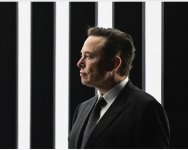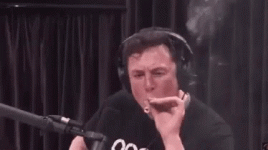Omnibus : Elon Musk's Twitter Acquisition
- Thread starter B00Mer
- Start date
You are using an out of date browser. It may not display this or other websites correctly.
You should upgrade or use an alternative browser.
You should upgrade or use an alternative browser.
Their job?
It's obvious you can't think for yourself.. The Liberals need you to think their way.. like Bill C11..
I'm not sure if that was a Freudian slip or if they just simply don't care anymore about hiding the utter loathing they have for free, independent thought. Its so hard to tell these days with all the overt narcissism and contempt for non-conformity.
TITS is a school Elon wants establish.It's tits up time for Tweeter.
Texas Institute of Technology and Science.
TITS is a school Elon wants establish.
Texas Institute of Technology and Science.
I have no problem with tits. I think that they look really great on females.
It has all the makings of a juicy corporate takeover saga.
On one side we have Elon Musk, the world’s richest man, positioning himself to buy Twitter for $43 billion (U.S.), and not just because he wants to make money from the social media company. He says he wants to enhance freedom of speech, improve society and bolster democracy to boot.
On the other side, we have the board of directors and senior management, throwing on the brakes, designing a poison pill, shopping around for other suitors and casting doubt on Musk’s seriousness.
There’s big money, big ego and big tech rolled up in a big ball of intrigue.
Business media are digging through Musk’s filings and history with securities regulators, looking closely at his record of building Tesla into the world’s dominant electric vehicle producer, and wondering aloud what he will do with all the personal data those cars collect.
There are even reports of coded messages hidden in the prospectus — occasional mentions of the figure 420, which is understood as a reference to smoking cannabis.
But this is not just a soap opera. It’s a stealthy run at any attempt to dilute the scope of social media platforms — and indirectly, a warning to Canadian legislators moving at pre-digital speed on how to contain or corral their power.
The Liberals have had a few false starts at this.

 www.thestar.com
www.thestar.com
A year ago now, in the face of internet-fuelled terror attacks, collapsing traditional media and mounting disinformation about the pandemic, they were pushing legislation on three different fronts: They wanted to impose Canadian content requirements on streaming services. They wanted to build a revenue stream for traditional media by having the web giants give up some of their advertising revenue. And they wanted to quash hate speech online.
The goal was to bolster Canadian culture and news sources while circumscribing the power of large multinational companies and stifling the more dangerous elements of the internet.
But none of those initiatives made it to the finish line before last summer’s federal election — in part because trying to impose rules on something as unruly as the internet is extremely complicated, and in part because the Conservatives whipped up opposition by equating those efforts with a government clampdown on freedom of speech.
Now, Heritage Minister Pablo Rodriguez is trying again, consulting far and wide, making adjustments to the government’s approach from a year ago. He has just tabled C-18, which would compel Google and Facebook to make deals that compensate traditional media organizations for sharing their news content. He has also tabled C-11, which would update the Broadcast Act so that the federal broadcasting regulator — the CRTC — would oversee Netflix and the like for their contributions to Canadian content.
He has yet to figure out how to craft legislation on online harms — or “online safety” as they now call it.
But things have changed over the course of the year. The freedom-of-speech critique from the pre-election days has taken on new vigilance. With the convoy protests, the Conservative leadership campaign and the persistent push south of the border, the call for “freedom” has attached itself not just to the debate about how to regulate social media, but also to vaccines, wearing masks and following all manner of public health restrictions.
The Liberals’ attempts at a do-over for platform governance, contentious from day one, are bumping into well-financed protesters, a public that is fed up with following rules, and the likes of Pierre Poilievre.
Last weekend, on the 40th anniversary of the Canadian Charter of Rights and Freedoms, Poilievre — in his campaign to lead the Conservative Party — accused Prime Minister Justin Trudeau of attacking that very charter by undermining freedom of speech with his “censorship laws.”
Polarizing is putting it mildly.
It’s no wonder that the Liberal election promise to have all the legislation lined up within 100 days of taking office has run into difficulty.
Last summer, when the government sought public input into how to clamp down on hate speech, child porn and other online harms, it came away with a large report that concluded that Canadians really wanted Ottawa to step in and make sure everything was OK. They just weren’t sure how.
Now, however, even that thin summertime consensus that Ottawa should step in at all has become fodder for political battle, in the House of Commons, on the Conservative campaign trail and on social media platforms themselves.
And in the meantime, the federal government has now added disinformation to the list of things it hopes to resolve, somehow — perhaps as part of the online safety package, perhaps as a separate initiative along with other countries.
The list of worrisome social media tentacles is never going to get any shorter, and the polarization around whether government needs to take a heavier hand or be hands-off completely is only intensifying.
The platforms themselves have taken some initiatives to self-regulate, partly in an attempt to get out ahead of regulation. But Musk’s push to take over Twitter suggests even the tendency toward self-regulation goes too far.
“I invested in Twitter as I believe in its potential to be the platform for free speech around the globe, and I believe free speech is a societal imperative for a functioning democracy,” he wrote in a letter disclosed in his securities filings. “However, since making my investment I now realize the company will neither thrive nor serve this societal imperative in its current form.”
This push toward hands-off has set off alarm bells in the American civil rights community who fear for the fate of minorities of all kinds. It should set off alarm bells in Ottawa, too.
On one side we have Elon Musk, the world’s richest man, positioning himself to buy Twitter for $43 billion (U.S.), and not just because he wants to make money from the social media company. He says he wants to enhance freedom of speech, improve society and bolster democracy to boot.
On the other side, we have the board of directors and senior management, throwing on the brakes, designing a poison pill, shopping around for other suitors and casting doubt on Musk’s seriousness.
There’s big money, big ego and big tech rolled up in a big ball of intrigue.
Business media are digging through Musk’s filings and history with securities regulators, looking closely at his record of building Tesla into the world’s dominant electric vehicle producer, and wondering aloud what he will do with all the personal data those cars collect.
There are even reports of coded messages hidden in the prospectus — occasional mentions of the figure 420, which is understood as a reference to smoking cannabis.
But this is not just a soap opera. It’s a stealthy run at any attempt to dilute the scope of social media platforms — and indirectly, a warning to Canadian legislators moving at pre-digital speed on how to contain or corral their power.
The Liberals have had a few false starts at this.

Heather Scoffield: Elon Musk’s attempt to buy Twitter should be setting off alarm bells in Ottawa
It’s no wonder that the Liberal election promise to have all legislation governing the internet lined up within 100 days of taking office has run into difficulty, Heather Scoffield writes.
A year ago now, in the face of internet-fuelled terror attacks, collapsing traditional media and mounting disinformation about the pandemic, they were pushing legislation on three different fronts: They wanted to impose Canadian content requirements on streaming services. They wanted to build a revenue stream for traditional media by having the web giants give up some of their advertising revenue. And they wanted to quash hate speech online.
The goal was to bolster Canadian culture and news sources while circumscribing the power of large multinational companies and stifling the more dangerous elements of the internet.
But none of those initiatives made it to the finish line before last summer’s federal election — in part because trying to impose rules on something as unruly as the internet is extremely complicated, and in part because the Conservatives whipped up opposition by equating those efforts with a government clampdown on freedom of speech.
Now, Heritage Minister Pablo Rodriguez is trying again, consulting far and wide, making adjustments to the government’s approach from a year ago. He has just tabled C-18, which would compel Google and Facebook to make deals that compensate traditional media organizations for sharing their news content. He has also tabled C-11, which would update the Broadcast Act so that the federal broadcasting regulator — the CRTC — would oversee Netflix and the like for their contributions to Canadian content.
He has yet to figure out how to craft legislation on online harms — or “online safety” as they now call it.
But things have changed over the course of the year. The freedom-of-speech critique from the pre-election days has taken on new vigilance. With the convoy protests, the Conservative leadership campaign and the persistent push south of the border, the call for “freedom” has attached itself not just to the debate about how to regulate social media, but also to vaccines, wearing masks and following all manner of public health restrictions.
The Liberals’ attempts at a do-over for platform governance, contentious from day one, are bumping into well-financed protesters, a public that is fed up with following rules, and the likes of Pierre Poilievre.
Last weekend, on the 40th anniversary of the Canadian Charter of Rights and Freedoms, Poilievre — in his campaign to lead the Conservative Party — accused Prime Minister Justin Trudeau of attacking that very charter by undermining freedom of speech with his “censorship laws.”
Polarizing is putting it mildly.
It’s no wonder that the Liberal election promise to have all the legislation lined up within 100 days of taking office has run into difficulty.
Last summer, when the government sought public input into how to clamp down on hate speech, child porn and other online harms, it came away with a large report that concluded that Canadians really wanted Ottawa to step in and make sure everything was OK. They just weren’t sure how.
Now, however, even that thin summertime consensus that Ottawa should step in at all has become fodder for political battle, in the House of Commons, on the Conservative campaign trail and on social media platforms themselves.
And in the meantime, the federal government has now added disinformation to the list of things it hopes to resolve, somehow — perhaps as part of the online safety package, perhaps as a separate initiative along with other countries.
The list of worrisome social media tentacles is never going to get any shorter, and the polarization around whether government needs to take a heavier hand or be hands-off completely is only intensifying.
The platforms themselves have taken some initiatives to self-regulate, partly in an attempt to get out ahead of regulation. But Musk’s push to take over Twitter suggests even the tendency toward self-regulation goes too far.
“I invested in Twitter as I believe in its potential to be the platform for free speech around the globe, and I believe free speech is a societal imperative for a functioning democracy,” he wrote in a letter disclosed in his securities filings. “However, since making my investment I now realize the company will neither thrive nor serve this societal imperative in its current form.”
This push toward hands-off has set off alarm bells in the American civil rights community who fear for the fate of minorities of all kinds. It should set off alarm bells in Ottawa, too.
Yesterday, Elon Musk tweeted "woke mind virus is making Netflix unwatchable."
Today, at open, Netflix stock crashed 30%.

Today, at open, Netflix stock crashed 30%.
Elon Musk’s attempt to buy Twitter should be setting off alarm bells in Ottawa


Heather Scoffield: Elon Musk’s attempt to buy Twitter should be setting off alarm bells in Ottawa
It’s no wonder that the Liberal election promise to have all legislation governing the internet lined up within 100 days of taking office has run into difficulty, Heather Scoffield writes.
The liberals and their media pals are scared that people will be able to speak up without the government having any way to shut them down.
Will they cripple pro environment and climate change disinformation?The liberals and their media pals are scared that people will be able to speak up without the government having any way to shut them down.
Not on your life .Will they cripple pro environment and climate change disinformation?
Don't worry, libs
Elon isn't taking over Twitter to ban you
Let's just call it a...Great Reset
CNN+ is shutting down.
Disney is being reined in.
It's a bad time to be woke.
Elon isn't taking over Twitter to ban you
Let's just call it a...Great Reset
CNN+ is shutting down.
Disney is being reined in.
It's a bad time to be woke.
Musk gets Twitter for $44 billion, to cheers and fears of 'free speech' plan

Musk gets Twitter for $44 billion, to cheers and fears of 'free speech' plan
Elon Musk clinched a deal to buy Twitter Inc for $44 billion cash on Monday in a transaction that will shift control of the social media platform populated by millions of users and global leaders to the world's richest person.
Liberal users have vowed to leave Twitter after it was confirmed billionaire Elon Musk will be buying the platform in a deal that could change the global social media landscape.
Just like they did when they threatened to Leave the USA and move to Canada
 if Trump won..
if Trump won..
Phew, thank Gawd that never happened

Just like they did when they threatened to Leave the USA and move to Canada
Phew, thank Gawd that never happened

